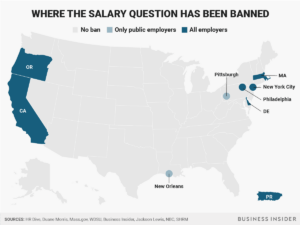The Salary Question Ban

“What’s your current salary?” can no longer be asked when interviewing a candidate for a job. The law, which bans employers form asking candidates about their salary is an attempt to address the gender pay gap. Women, on average, still earn about 80 cents to a man’s dollar nationwide, according to the National Women’s Law Center, and the gap has not narrowed substantially in the past decade.
The following states, according to Business Insider, have banned the salary question:
- Californiahas banned private and public employers from asking about a candidate’s pay history. The law will take effect in January 2018, according to HRDive.com.
- Delaware banned all employers from asking candidates about their salary history. The law will take effect in December 2017, according to Duane Morris.
- Massachusettsprohibited all employers from inquiring about a candidate’s pay history. This law will go into effect in July 2018, according to Mass.gov.
- New Orleans banned inquiries about all city departments and employees of contractors who work for the city. The rule is already in effect, but, in this case, it only impacts individuals who are interviewing to work for the city of New Orleans, according to WDSU.
- New York Cityhas banned public and private employees from asking about a candidate’s pay history. The law goes into effect October 31, 2017, Business Insider previously reported.
- Oregonhas banned all employers for inquiring about a candidate’s salary history. The law goes into effect January 2019, according to Jackson Lewis.
- Philadelphia banned the salary history question for all employers. The rule was supposed to take effect May 23, but a judge halted it temporarily due to a lawsuit from the Chamber of Commerce, according to NBC.
- Pittsburghbanned city agencies from asking about candidates’ pay history. The rule is effective immediately, but only effects city employees, SHRM reported.
- Puerto Rico banned employers from inquiring about a candidate’s pay history. The law will go into effect March 2018, according to Jackson Lewis.
New ApplicantStack customers will have applications questionnaires that no longer have the question. If you would like us to include the question, then please contact support at https://help.www.applicantstack.com/hc/en-us/requests/new
For any existing customer that would like the question removed, please contact us immediately at https://help.www.applicantstack.com/hc/en-us/requests/new and we will remove the question from your application.
Simplify HR management today.
Simplify HR management today.
How Improving Candidate Engagement Influences the Hiring Process
Applicants invest considerable time, effort, and thought into their job applications. Regrettably, it’s all too common for employers to delay responses, with some failing to provide any follow-up whatsoever. Such practices can have a negative effect on the candidate experience, influencing your organization’s hiring efficiency and reputation. Ensuring a positive experience for candidates is crucial…
Read MoreUnderstanding Boomerang Employees and How They Can Benefit Your Company
The phenomenon known as “the great resignation” emerged as a significant consequence of the COVID-19 pandemic, with its onset in 2021. This period was marked by an unprecedented wave of resignations—over 50 million workers chose to leave their jobs voluntarily. This mass exodus created a frantic search for talent across industries. Key drivers behind this…
Read More





